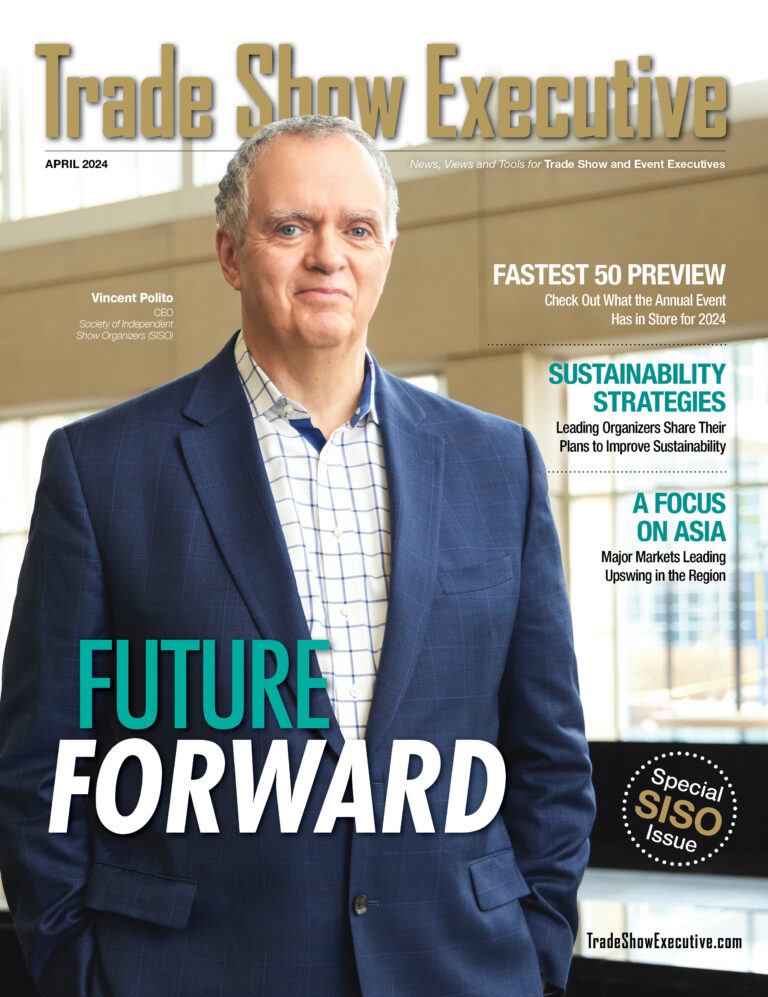CHICAGO — The Freeman Trends Report on 2024 Attendee Intent and Behavior, which was published on Jan. 16, revealed the motivations, expectations and needs of event attendees for 2024 and beyond.
The survey suggests trade show organizers analyze their attendees based on socioeconomic status, age, gender and event type because those are the best predictors of the values and behaviors of attendees. Trade show organizers must look closely at their audience to discover their specific needs and expectations.
A common demand from the four different groups — Generation Z, Millennial, Generation X and Boomer — are personalized experiences, which can be created successfully when an organizer understands their attendees. Freeman encourages the use of AI to meet this demand. The report also uses the XLNC Framework to break down attendee motivations and drivers, which stands for experience, learning, networking and commerce.
“In a fast-changing, multi-generational meetings environment, planners need to harness the power of personalization to attract and satisfy the most diverse audience we have seen in our industry. Focusing on what attracts attendees versus what they enjoy while at the event are often two very different things. In this report, we use the power of data and insights to give meeting planners an edge in a highly competitive race to draw the best and brightest to our meetings,” said Ken Holsinger, Senior Vice President of Strategy and Research at Freeman.
Findings Using XLNC Framework
According to the survey, the most important experience elements are immersive experiences (64%), customized agenda plans (45%), technology that makes consuming the event easier (44%), and immersive, visually appealing atmospheres (43%). Games or competitions, wellness opportunities and more natural lighting fell to the bottom of priorities with less than 7% of respondents saying they were important.
The survey found that 70% of respondents chose in-person events as one of the top sources for training and professional content, and 53% indicated online events (a 7% decrease from the 2023 survey). However, since a larger number (58%) of Next Generation Event-Goers look to online sources like LinkedIn and YouTube for professional content, Freeman suggests using this as an opportunity to prioritize training at events.
Seventy-five percent of respondents said demonstrations and hands-on activities were a preferred format for education/technical information, and 52% preferred unstructured interactions with experts. There were year-over-year decreases for those preferring structured sessions in a classroom with a speaker or panel and video demonstrations. When it comes to the value of online events, overall convenience and access to educational content are the most important.
Networking opportunities are imperative at in-person trade shows and events, and the survey dug into the preferred types of networking and found the following:
- 81% prefer speaking with experts
- 68% prefer meeting new contacts generally
- 64% prefer peer-to-peer exchange
- 54% prefer creating unique experiences with people they know
- 52% prefer discovering new commercial or research partners
Looking closer at the important elements of networking, Freeman found that attendees value similar professional challenges meet-ups, topic-specific meet-up opportunities, scheduled common interest meet-ups and areas where informal networking can occur.
Commerce is the most important event component for all respondents and especially for decision makers, according to the study. When it comes to discovering new products and services 80% of respondents identified in-person events as a top source, followed by company websites (62%), professional and trade organizations (53%) and journals and trade publications (51%). According to the survey results, hands-on demonstrations and samples are the most valuable commercial components because it allows attendees to see solutions in action.
Trends for In-Person Attendance
Freeman’s survey found that even more people view in-person events as the most trustworthy source of information in 2024 (80%), compared to 2023 (75%).
The perception of attendance reduction at in-person events is more optimistic for 2024 than in 2023, with 56% of respondents believing the reduction is temporary, compared to 48% in 2023, and 10% thinking it is permanent, down 7% from last year.
In 2024, the number of respondents preferring to attend in-person events to online ones is also up, with 82% preferring and selecting in-person options, and just 1% usually preferring and selecting the remote option.
However, 17% say that their preference depends on the specific event, signaling to the industry that there is still space for online events. When it comes to deciding to attend an online event, respondents reported that they value unique or compelling content, ability to access on-demand and price the most.
Respondents reported decreased travel budget, inflation, economic concerns, perceived safety in event location and decreased training budgets as the most common circumstances impacting attending an event. Only 23% cited world affairs and 18% cited local and state policies and politics as impacting their attendance. The most common reason for not attending an in-person event in the last 12 months was staffing shortages or workload pressures, but the percentage of those giving that reason decreased 6% from 2023.
Optimistically though, the report found a 50% decrease in the number of respondents who plan to attend fewer events in 2024, and respondents are planning on attending more events in 2024 than they planned to in 2023.
Find and download the full Freeman Trends Report on 2024 Attendee Intent and Behavior here.












